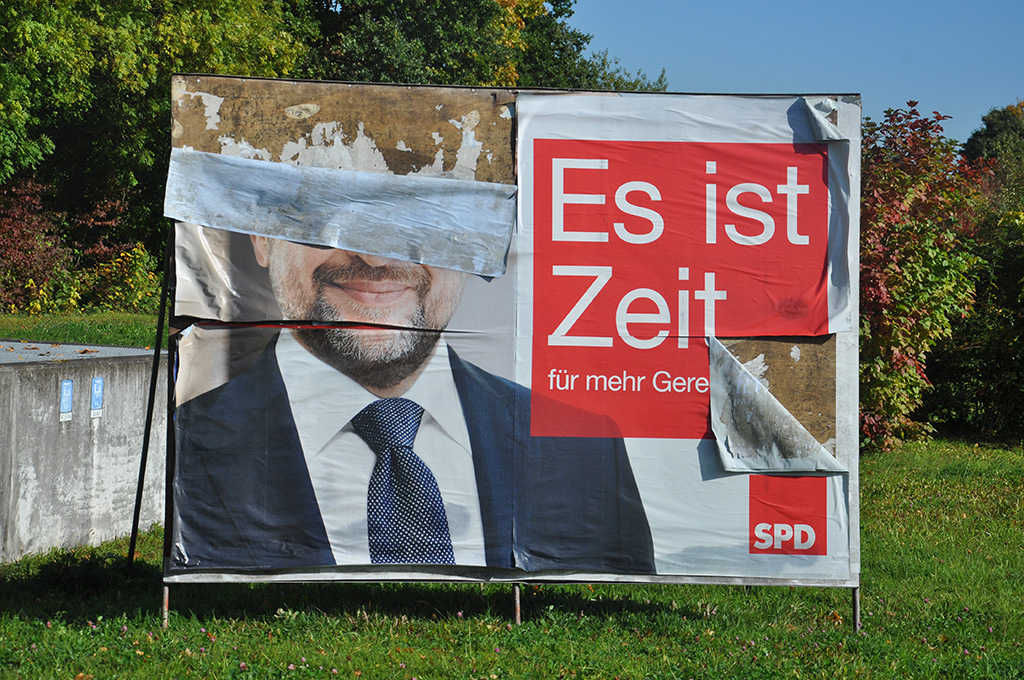
The construction of Europe in the post-war world was, as Jacques Delors used to say, “the offspring of the virtuos love affair between Christian Democracy and Social Democracy”. The former has changed a great deal, although in Germany it remains strong, albeit diminished. But in the EU’s two central countries, Social Democracy is in crisis (and in Germany, the Christian and Social Democrats’ combined share of votes has fallen to one of its lowest post-war totals). In France the Socialist Party became radicalised and after imploding at the last elections could take years to regroup. In Germany the SPD felt obliged to abandon the governing coalition with the Christian Democrats under Angela Merkel, in recognition –with one eye on France– of the fact that its 20.5% share, its worst result, is not a stable foundation. The only way to try to recover is reinventing itself in opposition (preventing the opposition being led by the right-wing, anti-European and xenophobic Alternative für Deutschland –AfD–). But this development weakens Merkel’s European enthusiasm, because her likely new partners may thwart her: the liberals impeding the reform and completion of the Economic and Monetary Union and the Greens doing their best to hinder common European defence. Such is the irony of the situation: just when France, under the social-liberal Emmanuel Macron, has once again become positive and proactive, Paris may find that Berlin is no longer the partner it was hoping for.
It is true that the French Socialists’ crisis has facilitated the emergence of Macron, who is dynamic in European matters, as he showed in his recent speech at the Sorbonne and his stance at the subsequent European Council meeting in Tallinn (Estonia). But this does not alter the fact that, in part, the weakness of these and other Social Democrats changes the course of European construction, distancing it from the famous “European social model”, which had been springing leaks for some time owing to globalisation, technological change and its own success. For the traditional sociological basis of social democracy has changed, diminishing it. And today neither Social Democracy nor anything else has the answers –or, at times, even the pertinent questions– for these new challenges. That said, when it comes to recasting the questions and answers, the SPD and its Friedrich Ebert Foundation will now play a fundamental role.
All this takes place against a backdrop of substantial electoral volatility in almost all countries. The Social Democrats have lost ground virtually throughout Europe to new left-wing and right-wing populists, or due to their own radicalisation. In the Netherlands and almost all the Scandinavian countries –quintessential Social-Democrat strongholds– they have faltered. The boundaries between parties, between ideological options, are ignored by voters. In France, many have gone directly from the former Communist Party to the National Front. In Germany, according to some estimates, the SPD lost votes in equal parts to the liberals, the Left (the post-communist Die Linke), the Greens and the AfD, losing most ground in the most economically deprived parts of Germany. Die Linke voters switched directly to liberals and the AfD again, especially in East Germany. And if that were not enough, the AfD’s support in terms of age groups is also worrying: it attracted a significant chunk of the youth vote, where the Social Democrats also sustained losses.
The Europhobes made particular inroads in the states of the former communist Germany, highlighting the fact that despite the money invested and the time that has elapsed since the fall of the Berlin Wall in 1989, the reunification of Germany has still not gelled in economic or social terms. Nor has a more general European unification gelled: most resistance to giving up sovereignty emanates today from the countries of the East, despite their economic growth and the funding they receive from Brussels: Kaczynski in Poland, Orbán in Hungary and Borisov with his insistence on sovereignty, pitted against those where moderation and pro-European attitudes, also in part Social Democratic, are on the wane.
The Social Democrats represent reconciliation between the state and the market from the perspective of the left. This was one of the cornerstones of the EU. As Sheri Berman points out, the competition that has characterised European politics for years has been “between a centre-left and centre-right that offered real policy differences but agreed on the basic framework of liberal, capitalist democracy”. This may have come to an end: at least for the time being, in the face of those who claim to be the “alternative to the status quo” for those who have lost out (who in the US were able to choose either Donald Trump and Bernie Sanders). It will have –and is already having– consequences for both the European project and Europe’s governance.


